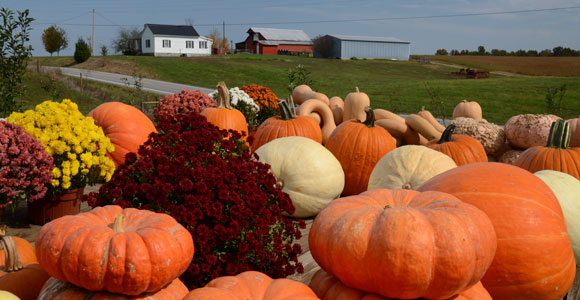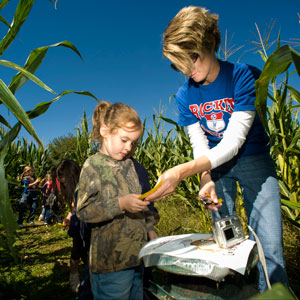
Everybody knows that visiting an apple orchard is a great family activity. Everybody knows that a “haunted” corn maze is frighteningly fun. And it’s no secret that farms across the state are growing huge fields of colorful chrysanthemums and pumpkins for happy customers to carry home.
Tennessee’s “fun farms” grow more than good times, though: Agritourism grows farm incomes, opportunities to keep families farming in the future, rural communities and economies, healthier lifestyles and understanding between the farm and nonfarm publics.
“Agritourism describes a segment of agriculture we call ‘direct farm marketing’ in which farmers have direct contact with consumers,” says Tonya Keller, agritourism farmer at Keller’s Corny Country in Dickson and president of the Tennessee Agritourism Association. “Visiting a working farm or any agricultural, horticultural or agribusiness operation for fun, education, entertainment or involvement in farm activity is agritourism activity.” The scope of agritourism can include agriculture-related places and events — wineries, crop festivals, farm-based bed-and-breakfasts, agricultural fairs and other possibilities.
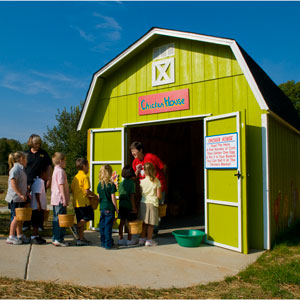
Of course, people have always visited apple orchards and enjoyed wagon rides and autumn festivals. Some 20 years ago, though, when Tennessee’s farms started to shrink and the state’s population grew, farm families began seriously considering and incorporating agritourism into their traditional farm operations. Today these fun farms are a primary link between country folk and city-slickers.
“In a state known for hospitality and scenic beauty, agritourism is a natural fit and represents a growing opportunity for farm families to supplement their incomes and to stay in farming,” says Tennessee Department of Agriculture Commissioner Julius Johnson. “It’s a great way for farmers and the public to have a shared experience, and we want to support and encourage it in any way we can.”
Additionally, agritourism plays an increasingly important role in the preservation of useful farmland, helping to reduce the decline of farm ownership and strengthening rural economies.
What makes “fun farms” different from other types of farming?
“Agritourism is a tool that has a direct impact on farm income from within the farm itself,” Keller says. “Farmers add value to what they produce without ever leaving their property. That enables them to receive full market value for what they grow.”
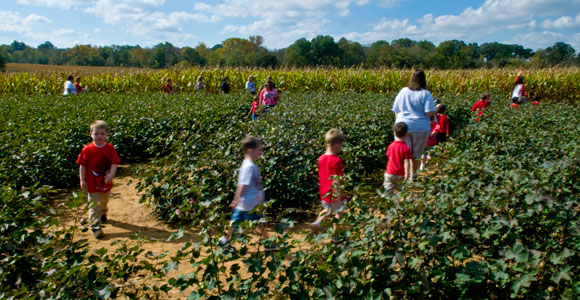
“Traditionally, Tennessee farmers are already a diverse group engaged in a wide variety of enterprises — often within a single farming operation,” says Keller. “The yield of only one of those enterprises may be relatively small, acting as a contributor as opposed to the anchor of a farming operation.
“Agritourism can be another ‘crop’ added to a farm — and it creates a positive by increasing populations of nonfarmers who are living closer and closer to our farms.
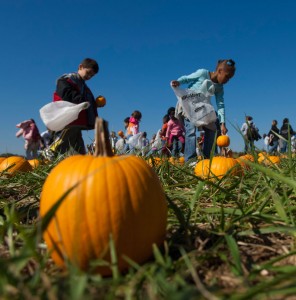
“We need to understand and appreciate each other, and having people come out to our farms to see how things grow and what we do just generally helps people realize that they want and need us here.”
Rose Ann Donnell, who farms and operates Donnell Century Farm near Jackson, says, “We open our farm to visitors to give them the opportunity to experience agriculture firsthand. Education is extremely important, especially in agriculture where most people take for granted where food and fiber come from. Our school field trips are hands-on. Kids participate in farm activities, then ‘sell’ their farm goods at a ‘farmers market’ for their snacks.
“Our small corn maze features Spookly, the square pumpkin. In this maze, children have fun and also receive an antibullying message.”
Additionally, agritourism operations offer seasonal employment for many more Tennesseans than just a farm’s family, too. In fact, according to Keller, fun farms provide a new source of income for entire rural communities. Agritourism farmers are often in need of many more farm products than they can actually produce themselves. The result? Neighboring farmers find new markets and new incomes by supplying the fun farms with pumpkins, gourds, Indian corn and other popular farm products.
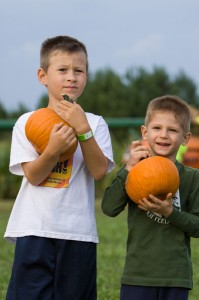 A recent study of the state’s agritourism industry by the University of Tennessee Institute of Agriculture estimates that the economic impact of Volunteer State agritourism has more than doubled between 2006 and 2012. Visitors to Tennessee agritourism operations in 2012 were estimated to have contributed $34.4 million directly to the state’s economy, with another $54.2 million generated indirectly.
A recent study of the state’s agritourism industry by the University of Tennessee Institute of Agriculture estimates that the economic impact of Volunteer State agritourism has more than doubled between 2006 and 2012. Visitors to Tennessee agritourism operations in 2012 were estimated to have contributed $34.4 million directly to the state’s economy, with another $54.2 million generated indirectly.
That’s big business — but for millions of visitors this fall, it’s just big fun. It’s fun for the farmers, too, who find that months of planning all spring and summer pay off in the smiles of their visitors.
Chuck McSpadden, who with his family owns and operates Apple Valley Orchard near Cleveland, says, “We want visitors to leave with smiles on their faces — and an apple or apple turnover in their hands. We see that most people, once they experience our apples and shop in our general store and bakery, they come back numerous times during the season. Children who come with their schools for our Johnny Appleseed educational tour usually come back with Mom and Dad in tow.”
“We have 25 amazingly fun attractions for the entire family,” says David Black of Oakes Pumpkin Patch and Corn Maze in Corryton. “We have three haunted attractions on the farm. The Trail of Doom is a haunted maze that is farm-themed. Chaotic Clown is a carnival-based haunt. New this year is Elemental Dark Journey, where you are blindfolded and experience wind, water, fire and earth.”
And their coolest attraction? “A goat walk where the goats walk over the crowd,” says Black. “We also opened up a new area called Toddler Town. We wanted to cater to the smallest of visitors to ensure they have a great time, too.
“We want you to leave with a memory.”
Find autumn agritourism activities now at PickTnProducts.org or on the free Pick Tennessee Mobile App.
Page photo courtesy of Andrew Dixon. Visitors to Granddaddy’s Farm near Etheridge can enjoy all sorts of farm activities and go home with armfuls of beautiful mums, gourds, pumpkins and home-grown foods.




